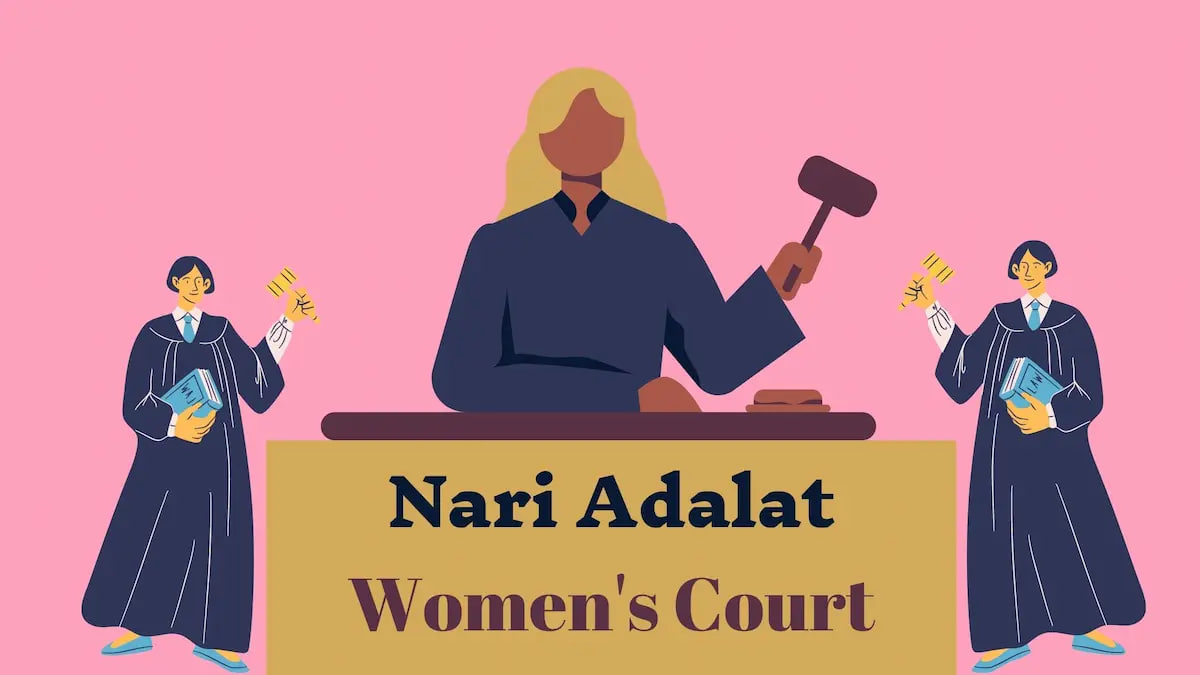Description

Copyright infringement not intended
Context: A new initiative by the Centre aims to empower women at the grassroots level by setting up women-only courts in villages. These courts, called Nari Adalats, will act as an alternative forum for resolving disputes related to domestic violence, property rights and other issues that affect women in a patriarchal society.
Details
- The scheme will be implemented on a pilot basis in 50 villages each in Assam and Jammu and Kashmir from August and will be scaled up to cover the entire country in the next six months.
- Each Nari Adalat will consist of 7-9 members, half of whom will be the elected representatives of the gram panchayat and the other half will be women with social standing such as teachers, doctors and social workers. The members will be nominated by the villagers themselves.
- It will be a part of the Sambal sub-scheme of Mission Shakti, a government initiative for women's safety and security. It will deal with cases that affect women and girls in the local community, such as domestic violence, dowry, divorce, property rights, etc
- The Nari Adalat will consist of members called Nyaya Sakhis, who are nominated or selected by the gram panchayat. They will act as legal friends and counsellors for the women and girls who approach them. The head of the Nari Adalat will be called Mukhya Nyaya Sakhi, who will be chosen among the Nyaya Sakhis every six months.
- The Nari Adalat does not have any legal authority, but it will use methods such as negotiation, mediation and reconciliation to resolve cases with mutual consent. It will also use pressure group tactics to influence the parties involved. The Nari Adalat will focus on restoring harmony and justice in the community.
- The Nari Adalat is a collaborative effort of the Ministry of Women and Child Development, the Ministry of Panchayati Raj, the Ministry of Rural Development and the Common Service Centers operated by the Ministry of Electronics and Information Technology.
- The Ministry of Women and Child Development has prepared detailed Standard Operating Procedures for all States, which will be released next week.

Nari Adalats
About
- Nari Adalats are not a new concept in India. They have been functioning in some states like Gujarat, Bihar and Madhya Pradesh for over two decades.
- They have been successful in providing speedy and affordable justice to women who face harassment, discrimination and violence at home and in society. They also create awareness among women about their rights and entitlements.
Features
- Informality and flexibility: Nari Adalats do not adhere to any strict legal rules or formalities. They use dialogue, mediation and negotiation as tools to settle disputes between parties.
- Accessibility and affordability: Nari Adalats are free of cost and easily reachable for women. They function at the village level, so women do not have to face any hassle or hardship in accessing them.
- Participation and democracy: Nari Adalats involve the community, especially women, in the process of delivering justice. They respect the local culture and values but also question them when they are unfair or harmful to women.
- Empowerment and transformation: Nari Adalats not only offer justice to women but also enable them to claim their rights and dignity. They also educate men and society about the importance of gender equality and justice
Significance
- Alternative to the existing formal and informal justice systems: They address the gap between formal and informal justice systems in India. The formal justice system is often inaccessible, expensive, time-consuming and insensitive to women's issues. The informal justice system, such as khap panchayats or caste councils, is often biased, patriarchal and regressive. Nari Adalats offer a third option that is more responsive, effective and progressive for women.
- Promote social change and development: By resolving disputes peacefully and amicably, they reduce violence and conflict in society. By empowering women and challenging patriarchy, they contribute to gender equality and social justice. By creating awareness and sensitization, they foster a culture of respect and harmony among different groups.
Challenges
- Lack of legal recognition and support from the state: Although they have been endorsed by the Supreme Court and some state governments, they do not have any statutory backing or authority. They often face resistance or interference from the police, judiciary or other formal institutions.
- They face resource constraints and capacity issues: They depend on voluntary contributions from the community or external agencies for their functioning. They often lack adequate infrastructure, training, documentation and monitoring systems.
- They face social and cultural barriers and backlash: They sometimes encounter hostility or opposition from the male-dominated or conservative sections of society who perceive them as a threat to their power or privilege. They also face challenges in dealing with complex or sensitive cases such as rape, dowry or honour killing.
Way forward
- Seek legal recognition and support from the state: The Centre should enact a law or policy that recognizes Nari Adalats as an alternative dispute resolution mechanism for women's issues. The state governments should provide financial, administrative and technical assistance to Nari Adalats.
- Enhance their resource base and capacity building: The Centre should allocate funds for Nari Adalats under various schemes such as Mahila Shakti Kendra or National Rural Livelihood Mission. The state governments should provide infrastructure, training, documentation and monitoring facilities to Nari Adalats.
- Overcome social and cultural barriers and backlash: The Centre should launch a nationwide campaign to create awareness and acceptance of Nari Adalats among the public, especially men. The state governments should ensure the security and protection of Nari Adalats from any threats or attacks.

Conclusion
- Nari Adalat is a unique initiative of women's courts in India, where women themselves act as judges and mediators to resolve disputes involving women's rights and domestic violence. It is based on the principle of participatory democracy, where women from different backgrounds and communities come together to form a collective voice and challenge the patriarchal norms and biases of the formal legal system. It will also educates women about their legal rights and entitlements, and helps them access various schemes and services of the government. It is a model of alternative dispute resolution that is cost-effective, speedy, and sensitive to the needs and aspirations of women.
Must-Read Articles:
WOMEN IN JUDICIARY: https://www.iasgyan.in/ias-gazette-magazine/perspective-women-in-judiciary
|
PRACTICE QUESTION
Q. Nari Adalat is a grassroots initiative that empowers women to resolve their disputes through collective deliberation and mediation. How can we assess the impact and effectiveness of Nari Adalat in promoting gender justice and women's rights? What are the main challenges and opportunities for scaling up and sustaining this innovative model of justice delivery?
|
\https://www.thehindu.com/news/national/coming-women-only-courts-for-alternative-dispute-resolution/article67053956.ece














